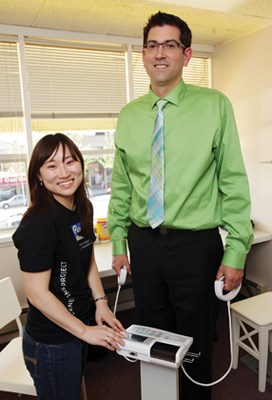THOSE behind a long-term national health research project are recruiting North Shore residents to participate, helping researchers learn more about preventing cancer and other chronic diseases for future generations.
The B.C. Generations Project is part of Canadian Partnership for Tomorrow, a national initiative endeavouring to collect health information and biological samples from 300,000 Canadians. Information gathered will help researchers explore, in decades to come, how genetics, environment, lifestyle and behavior contribute to the risk of developing cancer and other chronic diseases and why some people get sick and others don't.
"The idea is to focus on prevention and early detection," says director of the B.C. Generations Project, Marilyn Borugian, a B.C. Cancer Agency senior scientist, population and preventive oncology, and clinical assistant professor at the University of British Columbia.
Typically, when cancer research studies are conducted, cancer cases are recruited in much smaller numbers (dozens to hundreds) and are matched to healthy controls, taking into consideration things like age and sex, says Borugian, a North Vancouver resident. The difficulty is that participants are unable to remember the true answers
to important questions. Because the disease develops over decades, if researchers ask things about diet, activity, exposure to secondhand smoke, etc., going back maybe 30 years, people can't remember, but they'll still answer.
"The information isn't nearly as good, there's so much error," says Borugian. "This type of study is very attractive, particularly to be able to do it on a national scale, because what you're really doing isn't a study at all, it's infrastructure for many, many, many research studies of the future."
The B.C. Generations Project has set up a temporary assessment centre at 219-1940 Lonsdale Ave. in North Vancouver. The pop-up site is open Mondays to Saturdays until June 20.
The initiative, the first of its kind in Canada, is modelled after similar projects undertaken in other countries, including the United Kingdom. "It's really a gold standard for population work. You can't really use clinical trials for this work simply because you need too many people," says Borugian.
The initiative got underway in 2008 and recruitment is scheduled to be completed in March 2013. B.C. is one of five regions participating in the project - along with Alberta, Ontario, Quebec and Atlantic Canada - and the B.C. arm is operating under the umbrella of the B.C. Cancer Agency. Those involved are working to enroll 40,000 B.C. residents, aged 35-69.
Community members (of all cultures, medical backgrounds and genders) have two means of participating, either by completing a mail-in questionnaire, or visiting an assessment centre, like the North Shore temporary site. Participants are asked to fill out a health questionnaire, provide physical measurements, which include bone density, body mass and blood pressure, and donate blood and urine samples. The measurements and samples, while useful to the study, are not a requirement.
The collected data will be secured and used in a host of studies that have received ethics board approvals. Participants will continue to be followed and may or may not be requested to provide additional information in future years. "We follow them over their lifetimes, both actively and passively," says Borugian. "Actively, we might ask more questions. . . . And then passively we would link to Vital Statistics or the cancer registry to determine what happens to people."
So far, approximately 225,000 Canadians have signed up for the project and 22,600 B.C. residents.
"To be part of a study that's going to span several decades, and me being at the younger side of the scale, I have an opportunity to add a lot of value," says participant Tim Carmack, 35, a Port Coquitlam resident and branch manager of the Royal Bank on Lonsdale. A dad, Carmack was also attracted to the project's means of planning for his children's future. "I think it's everybody's chance to be a part of something that can change what we know of cancer and how to fight cancer and chronic diseases," he says.
The B.C. Generations Project North Shore assessment centre, funded by the B.C. Cancer Foundation, is open Mondays to Wednesdays from 11: 30 a.m. to 7: 30 p.m., and Thursdays to Saturdays from 8: 30 a.m. to 4: 30 p.m. A permanent B.C. Generations Project assessment centre is also open in Vancouver two days per week.
For more information on the B.C. Generations Project or to book an assessment centre appointment, visit www.bcgenerationsproject.ca or call 604-675-8221.



